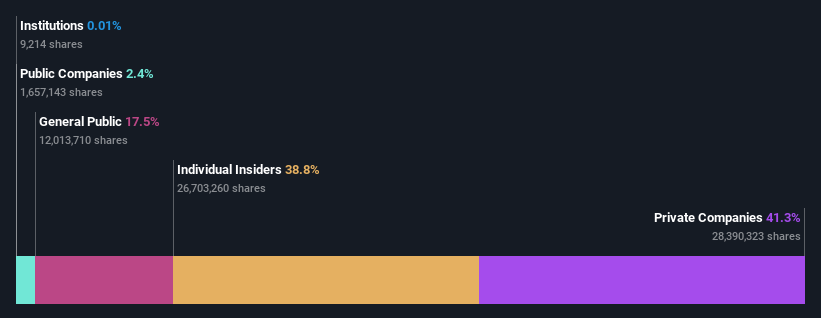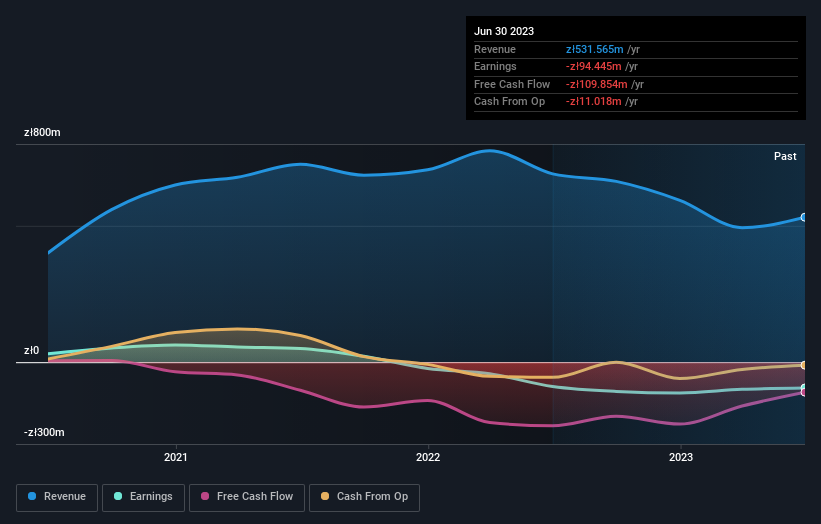- Poland
- /
- Electrical
- /
- WSE:CLC
Columbus Energy S.A. (WSE:CLC) surges 13%; private companies who own 41% shares profited along with insiders

Key Insights
- Columbus Energy's significant private companies ownership suggests that the key decisions are influenced by shareholders from the larger public
- A total of 2 investors have a majority stake in the company with 61% ownership
- Insider ownership in Columbus Energy is 39%
If you want to know who really controls Columbus Energy S.A. (WSE:CLC), then you'll have to look at the makeup of its share registry. And the group that holds the biggest piece of the pie are private companies with 41% ownership. That is, the group stands to benefit the most if the stock rises (or lose the most if there is a downturn).
While private companies were the group that reaped the most benefits after last week’s 13% price gain, insiders also received a 39% cut.
Let's delve deeper into each type of owner of Columbus Energy, beginning with the chart below.
See our latest analysis for Columbus Energy

What Does The Lack Of Institutional Ownership Tell Us About Columbus Energy?
Small companies that are not very actively traded often lack institutional investors, but it's less common to see large companies without them.
There are multiple explanations for why institutions don't own a stock. The most common is that the company is too small relative to funds under management, so the institution does not bother to look closely at the company. It is also possible that fund managers don't own the stock because they aren't convinced it will perform well. Columbus Energy's earnings and revenue track record (below) may not be compelling to institutional investors -- or they simply might not have looked at the business closely.

We note that hedge funds don't have a meaningful investment in Columbus Energy. Gemstone S.A. is currently the company's largest shareholder with 41% of shares outstanding. Meanwhile, the second and third largest shareholders, hold 20% and 6.9%, of the shares outstanding, respectively.
After doing some more digging, we found that the top 2 shareholders collectively control more than half of the company's shares, implying that they have considerable power to influence the company's decisions.
While studying institutional ownership for a company can add value to your research, it is also a good practice to research analyst recommendations to get a deeper understand of a stock's expected performance. Our information suggests that there isn't any analyst coverage of the stock, so it is probably little known.
Insider Ownership Of Columbus Energy
The definition of company insiders can be subjective and does vary between jurisdictions. Our data reflects individual insiders, capturing board members at the very least. The company management answer to the board and the latter should represent the interests of shareholders. Notably, sometimes top-level managers are on the board themselves.
Insider ownership is positive when it signals leadership are thinking like the true owners of the company. However, high insider ownership can also give immense power to a small group within the company. This can be negative in some circumstances.
Our most recent data indicates that insiders own a reasonable proportion of Columbus Energy S.A.. Insiders own zł180m worth of shares in the zł464m company. This may suggest that the founders still own a lot of shares. You can click here to see if they have been buying or selling.
General Public Ownership
The general public, who are usually individual investors, hold a 17% stake in Columbus Energy. This size of ownership, while considerable, may not be enough to change company policy if the decision is not in sync with other large shareholders.
Private Company Ownership
It seems that Private Companies own 41%, of the Columbus Energy stock. It might be worth looking deeper into this. If related parties, such as insiders, have an interest in one of these private companies, that should be disclosed in the annual report. Private companies may also have a strategic interest in the company.
Next Steps:
While it is well worth considering the different groups that own a company, there are other factors that are even more important. For example, we've discovered 4 warning signs for Columbus Energy (3 don't sit too well with us!) that you should be aware of before investing here.
Of course this may not be the best stock to buy. So take a peek at this free free list of interesting companies.
NB: Figures in this article are calculated using data from the last twelve months, which refer to the 12-month period ending on the last date of the month the financial statement is dated. This may not be consistent with full year annual report figures.
New: AI Stock Screener & Alerts
Our new AI Stock Screener scans the market every day to uncover opportunities.
• Dividend Powerhouses (3%+ Yield)
• Undervalued Small Caps with Insider Buying
• High growth Tech and AI Companies
Or build your own from over 50 metrics.
Have feedback on this article? Concerned about the content? Get in touch with us directly. Alternatively, email editorial-team (at) simplywallst.com.
This article by Simply Wall St is general in nature. We provide commentary based on historical data and analyst forecasts only using an unbiased methodology and our articles are not intended to be financial advice. It does not constitute a recommendation to buy or sell any stock, and does not take account of your objectives, or your financial situation. We aim to bring you long-term focused analysis driven by fundamental data. Note that our analysis may not factor in the latest price-sensitive company announcements or qualitative material. Simply Wall St has no position in any stocks mentioned.
About WSE:CLC
Columbus Energy
Provides solar photovoltaics and heat pumps installation and maintenance services in Poland.
Low with imperfect balance sheet.


